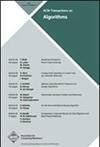确定性领导人选举的近最优时间-能量权衡
IF 1.4
3区 计算机科学
Q3 COMPUTER SCIENCE, THEORY & METHODS
引用次数: 1
摘要
我们考虑单跳无线网络模型中领导者选举问题的能量复杂度,其中每个设备v有一个唯一标识符ID (v)∈{1,2,⋖,N}。对于小型电池供电设备来说,能源是一种稀缺资源。对于这样的设备,大部分能量通常花在通信上,而不是计算上。为了接近实际的能量消耗,算法的能量复杂度定义为设备发送或收听的时隙数量在所有设备中的最大值。在了解无线网络领导人选举的能量复杂性方面已经取得了很大进展,但对时间和能量之间的权衡知之甚少。Chang等人[STOC 2017]表明,如果每个设备可以同时发送和侦听,但仍然留下在任何给定能量约束下确定最优时间复杂度的问题,则领导者选举的最优确定性能量复杂度为Θ (log log N)。时间-能量权衡:对于任意k≥log log N,我们证明了在最多N个设备中,如果每个设备可以同时传输和侦听,则可以在O (k * N 1+ε) + O (k * N 1/k)时间和O (k * N 1/k)能量中确定性地选出一个领导者,其中ε >0是任意小的常数。这改进了Chang等人之前的O (N)- O (log log N)-能量算法[STOC 2017]。我们提供了下界,以表明我们的算法的时间-能量权衡接近最优。密集实例:对于设备数量为n = Θ (n)的密集实例,我们设计了一个仅使用O(1)能量的确定性领导者选举算法。该算法改进了Jurdziński、Kutyłowski和Zatopiański的O (log* N)-能量算法[PODC 2002]和Chang等人的O (α (N))-能量算法[STOC 2017]。更具体地说,我们表明,当每个设备不能同时传输和侦听时,领导者选举的最优确定性能量复杂度为\(\Theta (\max \lbrace 1, \log \tfrac{N}{n}\rbrace)\),当每个设备同时传输和侦听时,其最优确定性能量复杂度为\(Θ (\max \lbrace 1, \log \log \tfrac{N}{n}\rbrace)\)。本文章由计算机程序翻译,如有差异,请以英文原文为准。
Near-Optimal Time-Energy Trade-Offs for Deterministic Leader Election
We consider the energy complexity of the leader election problem in the single-hop radio network model, where each device v has a unique identifier ID ( v ) ∈{ 1, 2, ⋖ , N } . Energy is a scarce resource for small battery-powered devices. For such devices, most of the energy is often spent on communication, not on computation. To approximate the actual energy cost, the energy complexity of an algorithm is defined as the maximum over all devices of the number of time slots where the device transmits or listens. Much progress has been made in understanding the energy complexity of leader election in radio networks, but very little is known about the tradeoff between time and energy. Chang et al. [STOC 2017] showed that the optimal deterministic energy complexity of leader election is Θ (log log N ) if each device can simultaneously transmit and listen but still leaving the problem of determining the optimal time complexity under any given energy constraint. Time–energy tradeoff: For any k ≥ log log N , we show that a leader among at most n devices can be elected deterministically in O ( k ċ n 1+ε ) + O ( k ċ N 1/k ) time and O ( k ) energy if each device can simultaneously transmit and listen, where ε > 0 is any small constant. This improves upon the previous O ( N )-time O (log log N )-energy algorithm by Chang et al. [STOC 2017]. We provide lower bounds to show that the time–energy tradeoff of our algorithm is near-optimal. Dense instances: For the dense instances where the number of devices is n = Θ ( N ), we design a deterministic leader election algorithm using only O (1) energy. This improves upon the O (log* N )-energy algorithm by Jurdziński, Kutyłowski, and Zatopiański [PODC 2002] and the O (α ( N ))-energy algorithm by Chang et al. [STOC 2017]. More specifically, we show that the optimal deterministic energy complexity of leader election is \(\Theta (\max \lbrace 1, \log \tfrac{N}{n}\rbrace)\) if each device cannot simultaneously transmit and listen, and it is \(Θ (\max \lbrace 1, \log \log \tfrac{N}{n}\rbrace)\) if each device can simultaneously transmit and listen.
求助全文
通过发布文献求助,成功后即可免费获取论文全文。
去求助
来源期刊

ACM Transactions on Algorithms
COMPUTER SCIENCE, THEORY & METHODS-MATHEMATICS, APPLIED
CiteScore
3.30
自引率
0.00%
发文量
50
审稿时长
6-12 weeks
期刊介绍:
ACM Transactions on Algorithms welcomes submissions of original research of the highest quality dealing with algorithms that are inherently discrete and finite, and having mathematical content in a natural way, either in the objective or in the analysis. Most welcome are new algorithms and data structures, new and improved analyses, and complexity results. Specific areas of computation covered by the journal include
combinatorial searches and objects;
counting;
discrete optimization and approximation;
randomization and quantum computation;
parallel and distributed computation;
algorithms for
graphs,
geometry,
arithmetic,
number theory,
strings;
on-line analysis;
cryptography;
coding;
data compression;
learning algorithms;
methods of algorithmic analysis;
discrete algorithms for application areas such as
biology,
economics,
game theory,
communication,
computer systems and architecture,
hardware design,
scientific computing
 求助内容:
求助内容: 应助结果提醒方式:
应助结果提醒方式:


